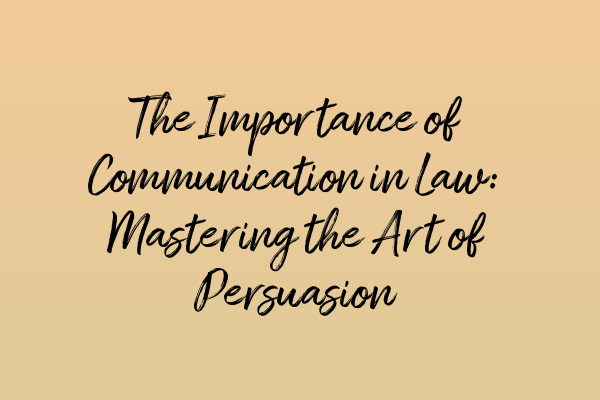The Importance of Communication in Law: Mastering the Art of Persuasion
In the field of law, effective communication is paramount. As legal professionals, our words and arguments can hold the power to shape outcomes and make a difference in the lives of our clients. Mastering the art of persuasion is a skill that every solicitor must strive to develop, as it can make or break a case. In this blog post, we will explore the importance of communication in law and provide insights on how to become a more persuasive advocate.
Why Communication Matters
Communication is the foundation of any successful relationship, and it plays an even more significant role in the legal profession. As solicitors, we must communicate with clients, opposing counsel, judges, and juries on a daily basis. The way we express ourselves verbally and in writing can have a profound impact on the way others perceive us and our arguments.
1. Building Strong Client Relationships
One of the first steps in becoming a persuasive advocate is building strong relationships with our clients. Effective communication allows us to understand their needs, concerns, and objectives. By actively listening and asking the right questions, we can gain a deeper understanding of their legal issues and provide tailored solutions. Through clear and concise explanations, we can ensure our clients are well-informed and confident in our abilities to represent them.
2. Presenting Clear and Compelling Arguments
In legal proceedings, the ability to present clear and compelling arguments is vital. Whether in written submissions or oral arguments, solicitors must be able to articulate their points in a persuasive manner. This involves structuring arguments logically, providing evidence to support claims, and anticipating potential counterarguments. By employing concise and precise language, we can effectively convey complex legal concepts and make them accessible to judges and juries.
3. Influencing Decision-Makers
Ultimately, the goal of persuasion in law is to influence decision-makers, be it a judge or a jury. The power of persuasion lies in our ability to present our client’s case in a manner that resonates with the decision-makers and convinces them of the validity of our arguments. By employing rhetorical techniques, such as storytelling, analogies, and emotional appeals, we can evoke empathy and connect with the decision-makers on a deeper level.
4. Navigating Negotiations and Mediation
Communication skills are also critical in negotiations and mediation. The ability to effectively communicate our client’s interests, negotiate favorable settlement terms, and find common ground with opposing parties is essential for achieving successful outcomes outside the courtroom. By understanding the motivations and perspectives of all parties involved, we can navigate the negotiation process with tact and diplomacy.
5. Building a Professional Reputation
Lastly, effective communication is essential for building a strong professional reputation as a solicitor. Clear and persuasive writing, for instance, can elevate our credentials and attract potential clients. Additionally, oral advocacy skills are often showcased in courtrooms and can contribute to our standing within the legal community. A reputation for being a persuasive and articulate advocate can open doors to new opportunities and enhance our career prospects.
Tips for Mastering the Art of Persuasion
Now that we have established the importance of communication in law, let’s explore some tips for mastering the art of persuasion:
1. Hone Your Writing Skills
Invest time in developing your writing skills. Craft well-structured legal arguments, use persuasive language, and ensure your writing is concise and free of unnecessary jargon. Tailor your writing style to the intended audience, whether it be a judge, a fellow solicitor, or a client.
2. Practice Active Listening
Active listening is a fundamental skill that allows you to better understand your clients and opposing counsel. Show genuine interest, ask clarifying questions, and repeat back what you have understood to ensure effective communication. By actively listening, you can build trust and foster more productive conversations.
3. Study Rhetoric and Persuasive Techniques
Take the time to study rhetoric and persuasive techniques used by skilled advocates. Understand how to construct a persuasive argument, employ rhetorical devices, and appeal to emotions to enhance your advocacy skills. Adapting your communication style to your audience can greatly improve the effectiveness of your arguments.
4. Seek Feedback and Continuous Improvement
Solicit feedback from colleagues, mentors, and clients to identify areas of improvement. Actively seek opportunities to enhance your communication skills, such as participating in advocacy competitions, attending workshops or conferences, and seeking additional training if necessary.
In conclusion, effective communication and the mastery of persuasion are essential skills for solicitors. By building strong client relationships, presenting clear and compelling arguments, persuading decision-makers, navigating negotiations, and building a professional reputation, we can enhance our effectiveness as legal professionals. Remember, communication is not only about speaking, but also about listening and understanding. By continuously honing our communication skills, we can become more persuasive advocates and make a significant impact in the field of law.
Related Articles:
– A Closer Look at the Bar Professional Training Course (BPTC)
– The Role of Technology in Modern Legal Practice
– Financing Your Law Degree: Understanding Costs and Options
– A Look into Prominent Law Firms in the UK
– Staying Ahead: Current Legal Industry Trends in the UK


Leave a Reply